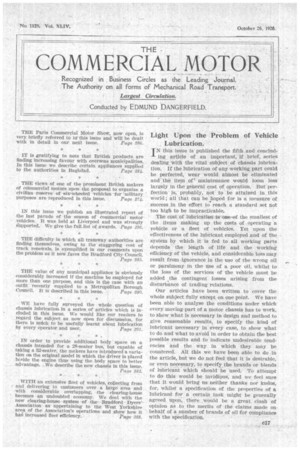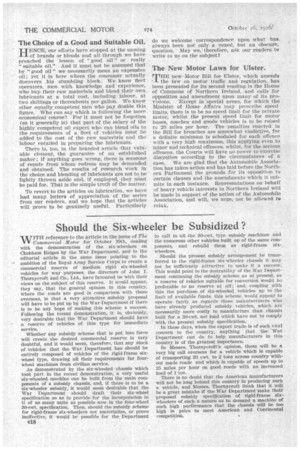Light Upon. the Problem of Vehicle _ Lubrication.
Page 39

Page 40

If you've noticed an error in this article please click here to report it so we can fix it.
TN this issue is published the fifth .ancl. conclud ing ing. article of an important, if brief, series dealing With the vital subject of chassis lubrication. If the lubrication of any working part could be perfected,' wear would almost be eliminated and. :the item of maintenance would loom less largely in thef general cost of operation. But perfection is, • probably,' not to be attained in this world ; all that can be hoped for is a measure 'of success in the effort to reach a standard set not too high to be impracticable.
The cost a lubrication is one-of the smallest of the items Making up the costs a operating 'a vehicle or a fleet of vehicles. Yet upon the effectiveness of the lubricant employed and of the system by which it is fed to all working parts 'depends the length of life and the working efficiency of the vehicle, and considerable loss may result from ignorance in the use of the wrong oil or parsimony in the use of a poor oil, whilst to the loss of the services of the vehicle must be added the contingent losses arising from the disturbance of trading relations.
Our articles have been written to cover the whole subject fully except on one point. We have been able to analyse the conditions under which every moving part of a motor chassis has to work, to show what is necessary in design and method to give reasonable results, to specify the kind of lubricant necessary in ever' case, to show what to do and what to avoid in order to obtain the best possible results and to indicate, undesirable tendencies and the way in which they may be countered. All this we have been able to do in the article, but we do not feel that it is desirable,. or even necessary, to specify.the brands or blends of lubricant which should be used.To attempt to do this would be invidious, and we feel sure that it would bring us neither thanks nor kudos, for, whilst a specification of the properties of a lubricant for a certain task, might be generally agreed upon,. there .would be a great clash of opinion as to the merits of the claims made on • behalf of a number of brands of oil for compliance with the specification.
The Choice of a Good and Suitable Oil.
ENCE, our efforts have stopped •at. the naming of brands or blends and all through we have preached the lesson of "good oil" or really "suitable oil." And it must not be assumed that by "good oil" we necessarily mean an expensive oil; yet it is here where the consumer actually discovers his stumbling block. We know fleet operators, men with knowledge and experience, who buy, their raw materials and blend their own lubricant's at a total cost, including labour, at two. shillings or thereabouts per gallon. We know other equally competent men who pay double this _ figure. Who can say which is following the more economical course? For it must not be forgotten (as it generally is) that part of the salary of the highly competent oil expert who can blend oils to the requirements of a fleet of vehicles must be added to the cost of the yaw materials and the labour entailed in preparing the lubricants. There is, too, in the branded a rtiCIe that valuable element, the guarantee of an established maker; if anything goes wrong, there is someone of repute from whom redress may be demanded and obtained: The results of research work in the choice and blending of lubricants are not to be lightly thrown aside and, if employed, they must be paid for. That is. the simple truth of the matter.
To revert to the articles on lubrication, we have had many letters of appreciation of the series from our readers, and we hope that the articles will prove to be genuinely useful. Particularly do we welcome correspondence upon what' bas • always been not only a vexed, but an obscure, question. May we, therefore, ask our readers to write to us on the subject?
The New Motor Laws for Ulster.
9-1FIE new. Motor Bill for Ulster, which amends -Ithe law on motor traffic and regulation, has been presented for its second reading in the House of Commons of Northern 'Ireland, and calls for opposition and amendment upon many of its provisions. Except in special areas, for which the Minister. of Home Affairs may prescribe speed limits, there i F., to be no speed limit for the private motor, whilst the present speed limit for motor buses, coaches and goads vehicles is to be raised to 20 miles per hour. The penalties enacted in the Bill for breaches are somewhat vindictive, for a definite minimum is scheduled for each offence with a very high maximum, this applying even to minor and technical offences, whilst, for the serious offences, the Courts will have no power to exercise discretion according to the circumstances of a case. We are glad that the Automobile Association has taken action and has laid before the Northern Parliament the grounds for its opposition to certain clauses and the amendments .which it submits in each instance. Representations on behalf of heavy vehicle interests in Northern Ireland will be made in support of the action of the Automobile Association, and will, we urge, not be allowed to relax.




































































































